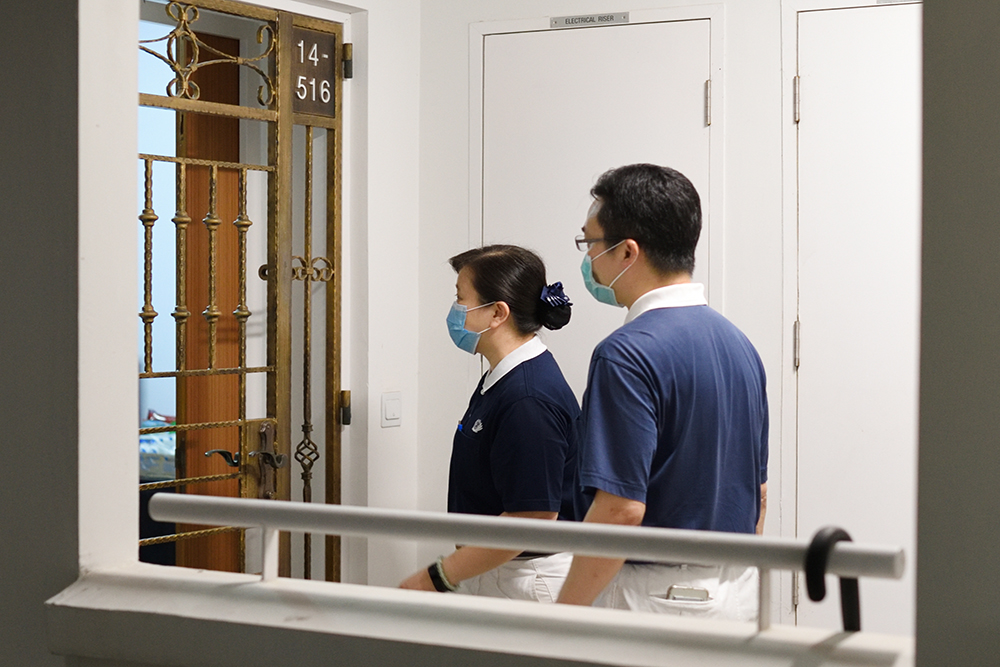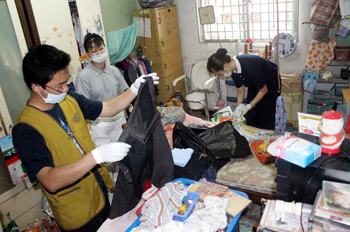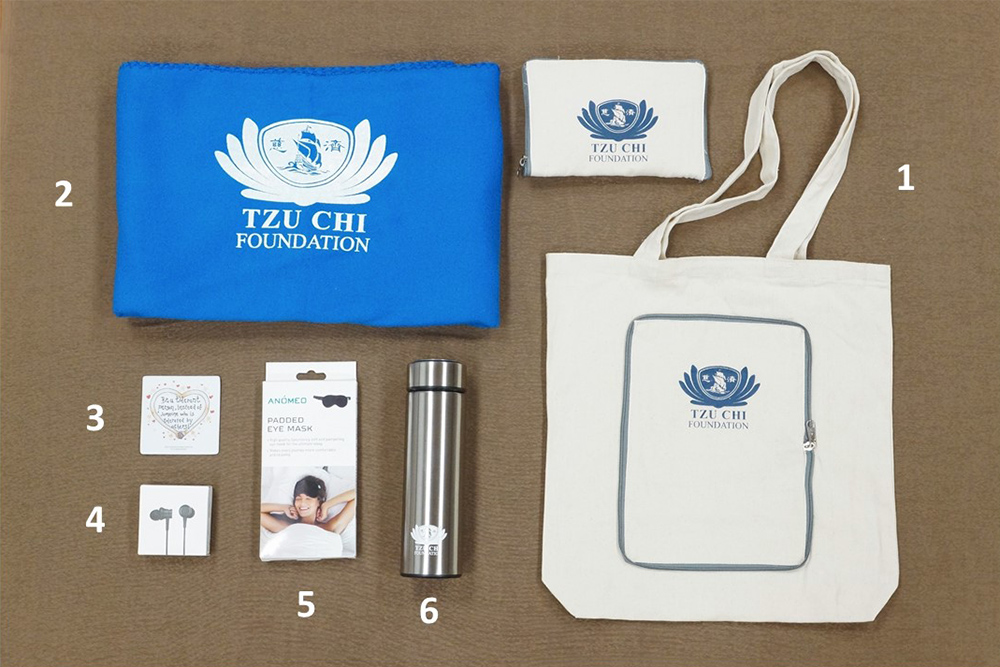
① Cotton Linen Eco-bag ② Blanket ⑥ Thermoflask ⑤ Eye mask ④ Earphones
③ Magnet with inspirational quotes
These comfort items, seemingly tailored for a long-haul flight, are actually heartfelt presents from Tzu Chi to ESKD patients. (Photo by Chan May Ching)
Items that appear to be long-haul flight essentials, such as blankets, eye masks, headphones, and a thermos flask, can be found in the cotton-linen eco bag. These, however, are welcome gifts in the form of a gift pack from Tzu Chi Foundation (Singapore) to end-stage kidney disease (ESKD) patients.
ESKD patients undergo dialysis treatment for up to four hours three times a week. The session is quite long, and they often feel tired and cold in the process. However, the kidney dialysis centre is usually bright and spacious, and the operation is intensive and compact, which is conducive to the medical work. But that makes it difficult for dialysis patients to rest well. Therefore, each item in the gift pack has been carefully selected to meet the actual needs, hoping that the dialysis patients can relieve the discomfort caused by fatigue and cold and get better rest during regular kidney dialysis sessions.
Preconceived and thoughtful care
Every month, our home visit volunteers visit hundreds of households, visiting care recipients who vary in age, gender, and family structure. However, about 150 have one thing in common – undergoing long-term dialysis treatment.
Establishing a genuine trust and emotional bond typically takes one or two years for both home visit volunteers and care recipients. However, care recipients undergoing dialysis under the care of Tzu Chi are usually part of the programme for just six months, only allowing for about six meet-ups.
Therefore, every visit holds immense value. With limited time and contact, home visit volunteers strive to make the most of each interaction. They proactively consider the needs of these care recipients and offer deep, targeted support. For instance, after initiating a case, a thoughtful care pack is given to the ESKD patient during the initial visit.
Chua Suk Qin, a member of the Renal Support Group cum home visit volunteer, shared, "The contents of the package are remarkably considerate. ESKD patients are pleasantly surprised upon receiving it when they first meet. Some even mentioned their reluctance to use the items!"
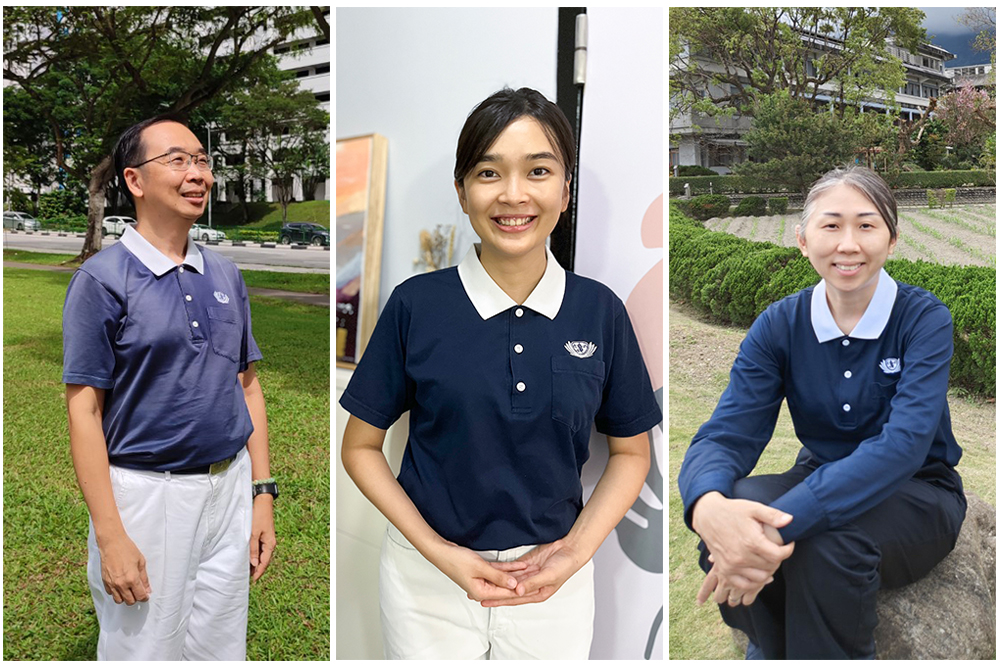
Pictured from the left to the right are home visit volunteers Low Ching Cheow, Chua Suk Qin, and Lee Hui Sze. They unanimously opined that the core of the visits is listening. A genuine understanding of one another's concerns is achieved through attentive listening. This understanding facilitates companionship in clarifying matters and alleviating the pressure of life. (Photos provided by respondents)
Tzu Chi offers interim dialysis assistance to ESKD patients, ensuring that those temporarily unable to afford dialysis can receive the treatment without financial worries. Additionally, Tzu Chi also provides transportation subsidies to those in need.
Throughout this period, home visit volunteers conduct monthly home visits. They described the six visits as "sandwich care", aptly describing the first and last visits as having a relatively consistent structure, while the visits in the middle are tailor-made to address the unique needs and challenges of each renal patient.
"The first thing to do is to comfort them so they can focus on dialysis without any financial concerns."
Home visit volunteer Chua Suk Qin emphasised that ESKD patients might feel overwhelmed or uneasy when they first start undergoing dialysis treatment. The primary goal of the visit is to mentally prepare them to face the reality of dialysis and address early-stage challenges, such as applying for dialysis subsidies.
Haemodialysis assumes part of the kidney's function by eliminating toxins and excess water from the body. Nevertheless, it also depletes some nutrients. Consequently, ESKD patients frequently experience fatigue and discomfort after dialysis. Yet, the discomfort transcends the physical aspect, encompassing psychological setbacks and confusion.
Chua Suk Qin noticed that most ESKD patients gradually come to terms with the reality of undergoing dialysis. However, life still doesn't quite measure up to their previous state of health. She explained, " ESKD patients feel a significant decline in their quality of life. They find themselves dependent on others for daily tasks and yearn to reclaim their former life."

Scaling questions are a common interviewing technique taught in training courses. They provide a structured way for respondents to convey the extent of their emotional distress. (Photo by Wong Siew Kuen)
During this phase, visitors frequently employ scaling questions to gauge the depth of emotional turmoil in dialysis patients. Examples include: "On a scale of 1 to 5, how would you rate your current mood?" and "Compared to before, do you feel your physical condition has improved due to dialysis? Please rate."
This approach serves a dual purpose – it aids the home visit volunteers in comprehending the emotional shifts and perceptions of the ESKD patient while also prompting the latter to observe life's subtle changes. This shift from a "Problem-focused" mindset to a "Solution-focused" perspective is crucial.
Home visit volunteer Lee Hui Sze, a member of the Renal Support Group, emphasised that the objective is to achieve incremental advancement each time. "The aim of dialysis is to restore health and enhance the quality of life. Many ESKD patients begin to notice an improvement in their physical state post-dialysis. I seek to help them recognise this progress. Even if they don't make leaps to '1 point' progress, any advancement, no matter how slight—say '0.1 points'—is still a step forward."
Chua Suk Qin reminded, “Don't just focus on treatments and symptom management. Encourage dialysis patients to explore newfound possibilities within their current lives. Enable them to believe that they can still savour life's offerings. Past achievements remain attainable. We should walk with them in discovering hope and glimpses of positivity in life."
To illustrate, Chua Suk Qin shared an anecdote. An elderly ESKD patient who was initially disheartened and contemplated discontinuing dialysis ultimately chose to persevere. She opted to spend cherished moments with her children and grandchildren while persisting in her dialysis regimen.
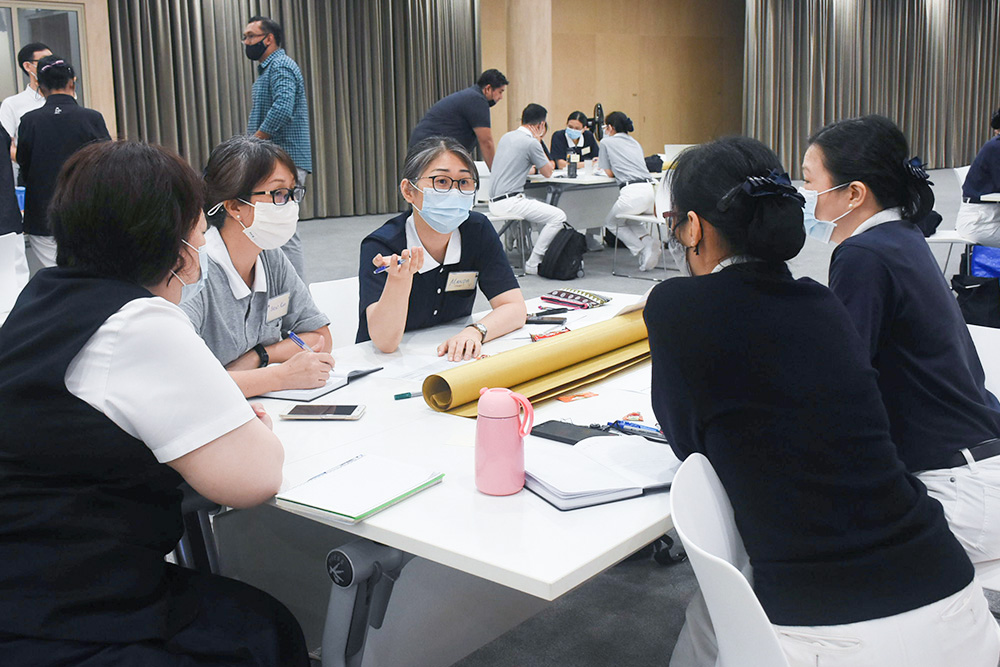 People with kidney failure must take extra precautions in their daily lives. However, Lee Hui Sze (third from left) shares that she encourages end-stage CKD patients to progress in small steps. (Photo by Wong Siew Kuen)
People with kidney failure must take extra precautions in their daily lives. However, Lee Hui Sze (third from left) shares that she encourages end-stage CKD patients to progress in small steps. (Photo by Wong Siew Kuen)
The compassion and wisdom in companionship
As the problems that ESKD patients face differ with each individual, there is no standard procedure for volunteers conducting home visits to follow. On a case-by-case basis, they would have to render support to the different attitudes and responses that patients may have. However, some basic principles taught in the Course on Conducting Charity Home Visits, such as asking quantitative questions and adopting a solution-based approach, still come in useful.
In one of the lessons in the course, volunteers learn the mantra, “Bodhisattvas have dharma instruments, while home visit volunteers have tools”. When meeting people facing difficulties, one would naturally lend a helping hand. However, given the changing societal needs, one person’s strength may not be sufficient.
According to Tzu Chi Charity Development Department Social Service Associate Alex Chan, the Renal Support Programme was formed to help ESKD patients obtain better care. When following up on patients for prolonged periods, volunteers would constantly reflect on how to better understand ESKD patients’ and their families’ circumstances better. This is done through careful observations during visits, experience, and professional knowledge and skills.
The Renal Support Programme launched in 2020 has three main pillars – Casework, Training, and Programmes. This support programme aims to provide better support for ESKD patients, improve satisfaction and motivation levels in volunteers, strengthen community partnerships, provide more all-rounded care under the plan, and raise awareness about kidney health in the community.
Under the Renal Support Programme, Tzu Chi has invited experts from the NKF to provide employees and volunteers with the necessary training needed to conduct home visits. Additionally, Tzu Chi regularly holds compulsory “warm-up” classes and advanced classes for home visit volunteers caring for ESKD patients. These training programmes aim to give volunteers a better understanding of the challenges that ESKD patients face and learn how to communicate with them using frameworks such as the Five Stages of Grief and Bio-Psychological-Spiritual (BPSS) model.
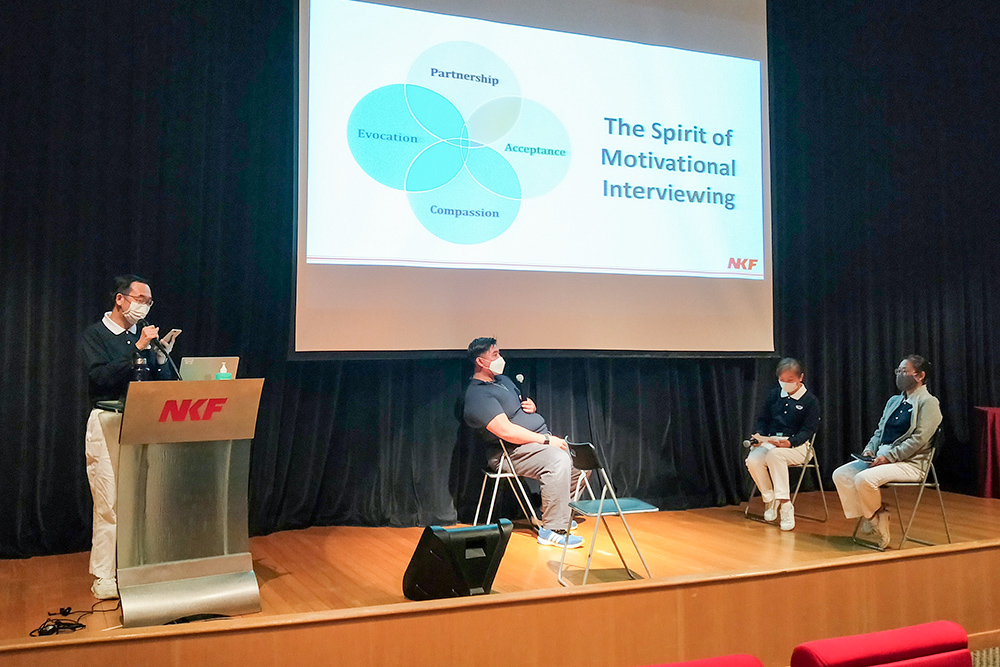
Under the Renal Support Programme, Tzu Chi invited experts from the NKF to provide essential training for its employees and volunteers. (Photo by Chua Poh Ling)
There are uncertainties and volatilities in every household
The first step in conducting home visits is to forge a good relationship with the ESKD patient. However, this is often the most challenging step. Organising a home visit is often not as easy as just making a phone call. Experienced home visit volunteer Low Ching Cheow points out that ESKD patients tend to have weaker immunity, causing some of them to be hospitalised frequently. Home visit volunteers thus have to face frequent changes in their home visit schedules.
Therefore, every home visit opportunity becomes more precious, and the volunteer has to do their best to build a good relationship with the care recipient. Low Ching Cheow encourages home visit volunteers to also contact their care recipients through phone calls or visit them in person at hospitals to strengthen the sense of care and enable the volunteers to make corresponding changes when the biannual home visits are affected.
For many ESKD patients, not only do they face medical issues, they often have other problems that medication or dialysis cannot solve. According to Low Ching Cheow, many patients who have not reached retirement age wish to return to work and continue to contribute to the family’s livelihood. However, the dialysis treatments needed thrice a week hinder their employment prospects, with many resorting to part-time work. For those who are not as lucky, their employers cannot empathise with their circumstances, rendering them helpless.
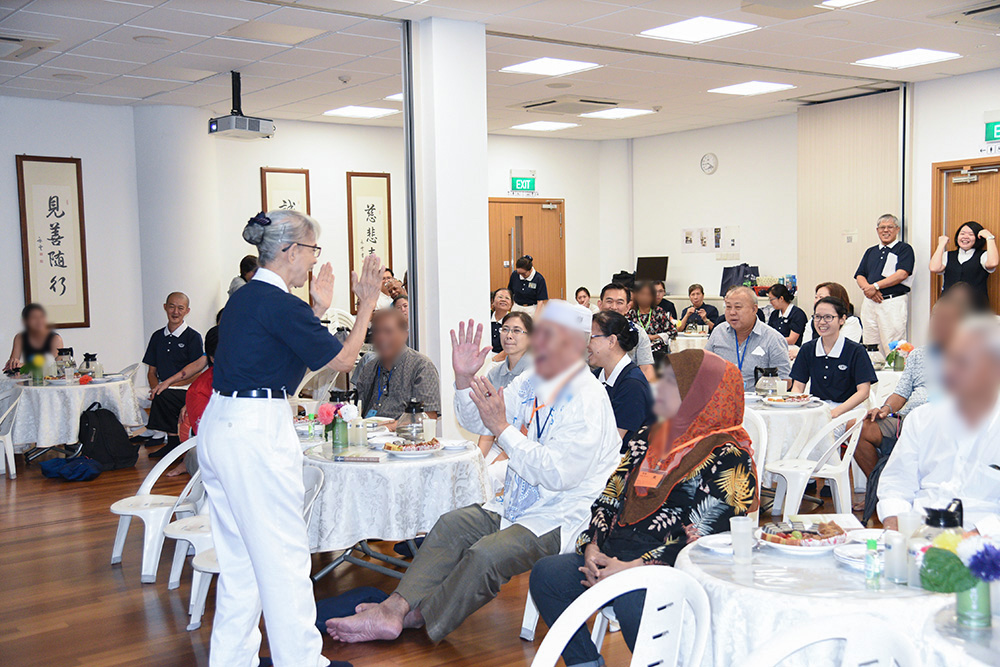
Apart from home visits, Tzu Chi also holds regular Renal Friends Gathering sessions to maximise individualised engagement and create a healthy support network. (Photo by Cheng Lai Har)
Everyone has their unique challenges
When conducting home visits, volunteers are not there to preach but to listen to the troubles the ESKD patients face. However, it is common to have patients doubt or even reject volunteers offering to lend a listening ear.
Home visit volunteer Lee Hui Sze recalls one such case, where she managed to piece together the tough times that the patient went through based on his fragmented stories. With experiences of abandonment and bullying from a young age, the patient felt that a simple and carefree life was unattainable. She could only know the tip of the iceberg from the patient's words. When patients are entrenched at the bottom echelons of society, it is inevitable that they experience anxiety and related mental health issues. Even with medical treatment, it can only do little to improve their lives.
Home visit volunteers should focus more on listening actively and providing appropriate advice and consolation when encountering bottlenecks. Lee Hui Sze also said that medical treatments cannot solve most of the external factors, such as being unable to find a job and birth family issues. She often reflects on how she can better render support to these patients.
Above all, home visit volunteers must respect the decisions that the patients' families make and trust that everyone can solve their problems to enact change in their lives. Lee Hui Sze herself has been inspired by the tenacity that ESKD patients have shown in times of adversity, and she learnt valuable life lessons from them.


